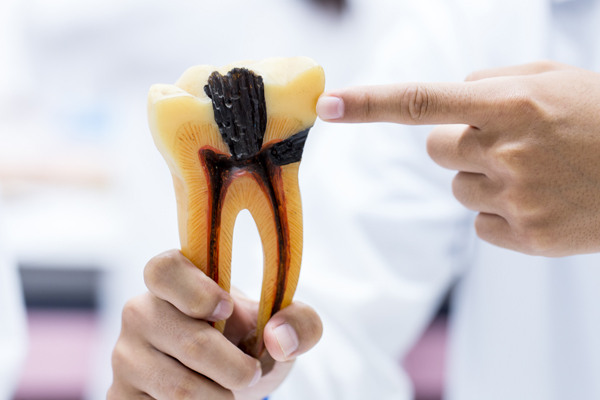Pain and Root Canals: What You Should Know

A root canal is one of the most effective treatments for saving a natural tooth and preserving oral health. While they have a negative reputation for being painful, this is no longer the case with modern pain management techniques. General dentists prioritize patient comfort during and after a root canal. Understanding the root canal process and what to expect afterward can help reduce worry and support a healthy recovery.
The root canal procedure
A root canal removes the infected pulp tissue from inside the tooth. The pulp, which contains nerves and blood vessels, can become inflamed or infected due to deep cavities, cracks, repeated dental procedures, or dental trauma. Once this occurs, the pulp cannot heal on its own and must be removed to prevent further complications. Thus, a general dentist will use dental X-rays to identify a deep infection and confirm the need for a root canal.
To begin root canal therapy, the dentist applies local anesthesia to numb the area, ensuring the procedure is as comfortable as possible. Once the area is fully numb, they will make a small opening in the tooth to reach its pulp chamber and root canals. Next, the dentist removes the infected pulp and cleans, shapes, and fills the tooth. The dental team then covers the opening with a temporary or permanent filling. The dentist will likely recommend a dental crown to restore the tooth’s full function and appearance.
Root canals and pain
Root canals are constantly associated with pain. However, the procedure itself is usually no more uncomfortable than receiving a dental filling or crown. The pain that patients often attribute to root canals typically stems from the infection present before treatment, not the procedure itself. Once the dentist removes the affected tissue and disinfects the canal, the patient typically feels immediate relief from the discomfort they were feeling before the procedure.
General dentists also rely on advanced tools and techniques that prioritize comfort throughout root canal therapy, making the experience more manageable. As previously mentioned, this can involve the use of local anesthesia to numb the area. It is normal to feel slight pressure or vibrations as the dentist completes the procedure, but they should not experience sharp pain.
Managing pain after a root canal
Mild sensitivity or discomfort is common after root canal therapy and can typically be managed with over-the-counter pain relievers. In order to protect the tooth, patients should avoid chewing on the treated side until the dentist places the permanent restoration. Additionally, gentle brushing, salt water rinses, and avoiding hard foods support healing and reduce irritation. If the dentist prescribes antibiotics, the patient will need to complete the full course to prevent postoperative infection and promote a smooth recovery.
Root canals make for a more comfortable smile
Although root canals have a poor reputation for being painful, they relieve pain in the long run. This is because once the inflamed or infected tissue is removed, the pressure, swelling, and sensitivity that caused the discomfort are resolved. Learn more in an appointment with the Winning Smiles Dentistry team at our Phoenix office.
Request an appointment here: https://www.winningsmilesaz.com or call Winning Smiles Dentistry at (602) 457-1999 for an appointment in our Phoenix office.
Check out what others are saying about our dental services on Yelp: Root Canal in Phoenix, AZ.
Related Posts
Cosmetic dental services have different types of procedures. Each one aims to restore the healthy function and appearance of your teeth. Complete treatments provide you with a healthier smile. Knowing if you are a good candidate for cosmetic dental services can help you prepare for your next appointment.These dental restorations can replace damaged teeth or…
Cosmetic dental services provide patients with multiple means of changing their smiles, from addressing small blemishes to completely reimagining their entire dentition. Cosmetic dentists are trained dental professionals who focus on aesthetics, but that does not mean they will damage the teeth in order to achieve a patient’s goals. In this way, they provide functional…
A dental bridge is often an important tooth-replacement option when one or more teeth are missing in the same area. Gaps in the smile affect chewing, speech, and overall oral health. Over time, missing teeth can also affect jaw alignment and place extra stress on the remaining teeth. Understanding how a bridge works helps patients…
Your general dentist can perform cosmetic dental services. These treatments aim to enhance one’s smile and general appearance. They also keep gums and teeth healthy. The following are the cosmetic dental services your general dentist may offer.Dental misalignment can cause more oral issues like gum disease. A patient may get traditional braces or clear aligners,…





